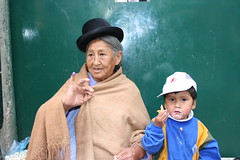“Grandmother and Grandson After Voting” (Photo Copyright 2005 Jonathan Lieberman)
Este artículo también está disponible en español.
It would seem that Bolivia has found itself a new president-elect in Evo Morales, the leftist candidate of the MAS (Movement Toward Socialism) party. For the latest vote count, Miguel Buitrago of MABB directs readers to the website of the National Electoral Court (ES) and specifically, this very nifty Java-powered graphic. Miguel Centallas has also been posting the latest election results graphics to his flickr account.
Jim Shultz, on Blog From Bolivia, says “headline writers in the foreign press have had a field day trying to pin a label on Morales’ surprise victory” and then tries to get beneath the rhetoric with his own analysis of the meaning behind the elections. Shultz also writes that he was disappointed with Evo Morales’ victory speech in Cochabamba which was more campaign-like than visionary and presidential. Dan Moriarty, currently in Bolivia for the holidays, agrees and notes in a comment that:
Alvaro Garcia Linera, Evo's VP, just gave the speech Jim rightly says Evo should have given – all about unity and working together, going beyond the campaign. I think it was pretty clear that Evo had no speech prepared. He seemed as surprised by this as anyone. Understandable.
Blogs de Bolivia has the most thorough summary of bilingual blogger analysis. It is absolutely worthwhile to check out Miguel's collection of excerpts from the English and Spanish-speaking bloggers that make up Bolivia's ever-growing community of online commentators.
Dan Glaister, of The Guardian notes, as does Nick Buxton, that “for the first time in modern electoral history a president has been elected in Bolivia with a majority of the popular vote.” Juan Forero of the New York Times points out that “President Hugo Chávez of Venezuela and President Néstor Kirchner of Argentina, two of the continent's leading left-leaning leaders, quickly offered their congratulations, as did Chile, Spain and the European Union.” But that the U.S. administration “offered cautious congratulations to Mr. Morales and to the Bolivian people “for carrying out a successful election.”
Jonathan Lieberman takes a break from his fun-loving commentary on Argentine and Chilean politics to give the Bolivian elections “a serious look” in his weblog, World Unfurled. Comparing U.S. and Bolivian voting procedures, he writes:
The ballots are huge, maybe 11 by 17 inches. They are full color, with the Candidate name, party, logo, photo and a check box fill a tall rectangle about 2 inches by 6 inches. You put an “X” in the very clearly marked box by the candidate. Perhaps [Americans] could learn a thing or two.
Maintaining his promised new standard of reporting, Jonathan still manages to stay true to his sense of humor when describing his quest to find a taxi driver and photograph a polling station.
Reuters reporter Angus MacSwan, writing from Sao Paulo, poses the question of whether Morales will be “a Lula or Chavez,” referring to Brazilian President Luiz Inacio Lula da Silva's moderate brand of social reform compared to the more militant Venezuelan president, Hugo Chavez. Luís Afonso Assumpção of swimming against the red tide recently noted that Morales is on friendly terms with both Lula da Silva and Chavez in his argument that the Sao Paulo Forum is much more than a debate club.
One of the seemingly most important and underreported stories is being tracked by Eduardo Avila, currently in Cochabamba, who links to an article in Univision claiming that some voters were wrongly erased from the voter registry:
Today with the campaign, we found cases of voters who did vote in the municipal elections, but were still subsequently erased. As a result, a member of the OAS electoral observation team came out from the city of Cochabamba to dialogue with party officials and disappointed voters who had all of the documentation, including voter card which showed that they did in fact vote in 2004. A laptop computer from the Corte Nacional was brought out, but no resolution was reached.
The BBC's radio program, Have Your Say discussed the Bolivian elections on today's show. And if you would like to have your own say, Robin Amer of Radio Open Source is currently seeking input on an upcoming show centered on Morales’ victory. She asks, “what’s the new moment for Bolivia, and for the continent? Why is socialism back in vogue? And how far will it go?”








2 comments